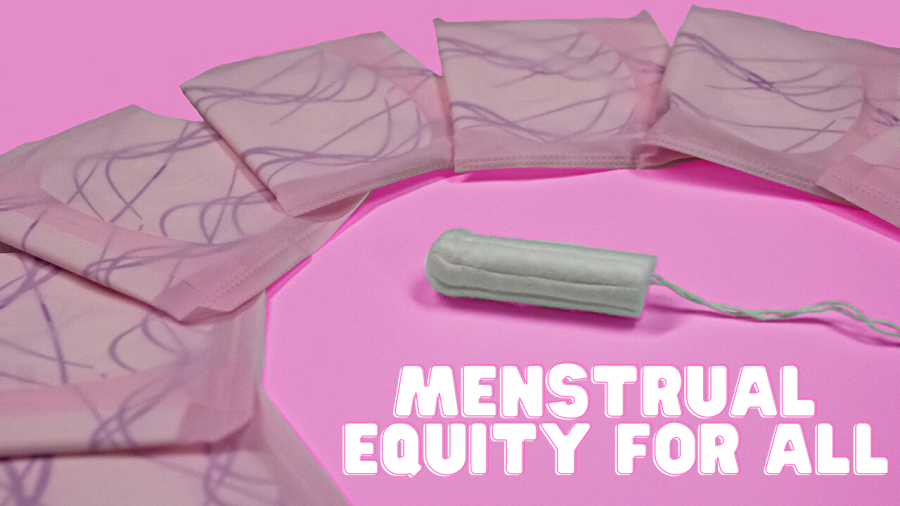CSU system to enforce menstrual product distribution in 2022-2023 school year
New California bill requires public schools to provide menstrual products on campus
California Assembly Bill 367, entitled “Menstrual Equity for All,” requires public schools to maintain an adequate supply of menstrual hygiene products, such as pads and tampons, in an accessible location before or beginning fall 2022. Sacramento State plans to distribute menstrual products in a number of restrooms across campus as well as other high-traffic locations for student convenience. Graphic made in Canva by Ayaana Williams.
December 8, 2021
Earlier this year, Gov. Gavin Newsom signed a bill that would require all public schools, including community colleges and California State Universities, to provide menstrual products on campuses across California.
California Assembly Bill 367, entitled “Menstrual Equity for All,” states that each college must maintain an adequate supply of menstrual hygiene products, such as pads and tampons, in a centralized and accessible location on campus before or beginning fall 2022.
“We will likely tackle the menstrual product project this summer when we have the in-house labor to do the work,” said Justin Reginato, associate vice president of facilities management at Sacramento State. “There will be some up-front planning to ensure we are putting dispensers in the most impactful locations.”
Facilities management is in the process of gathering information via surveys to figure out the best locations to distribute menstrual products in high-traffic areas throughout campus. Some potential locations would include libraries, pantries and restrooms.
“There are a lot of moving parts but being ready by the fall is very doable,” Reginato said. “The school plans to arrange a facilities team to begin setting up product distribution stations in an unconfirmed number [of] restrooms across campus.”
The bill does not require the state nor the CSU system to fund the products required for women identified students; this will be the responsibility of each individual institution.
Sac State President Robert Nelsen said the university will spend about $8,000 a year on menstrual products.
Although not heavily advertised, Sac State currently provides some menstrual products in the women’s resource center.
“Some student groups such as Sacramento State’s Mujeres Ayudanado La Raza were already stocking restrooms with menstrual products as community service work prior to the pandemic,” Sac State ASI President Samantha Elizalde said.
Other areas on campus where menstrual products are currently provided include the ASI Food Pantry, the Pride Center and the Student Health Pharmacy.
RELATED: Sac State students supply free menstrual products on campus
Sac State leadership has made an effort in recent years to stay a step ahead of support for women’s health on campus.
“This is a monumental hallmark of change for the campuses that are gonna be involved and just providing those for students that’s a big accomplishment,” said Aisha Engle, senior coordinator for the Women’s Resource Center.
School officials acknowledge that despite the changes not being made until next school year, AB 367 was long overdue and will be helpful for the academic success of Sacramento State students among others.
“I mean…57% of our population is women-identified students, and so you would hope that would be something they would be able to embark on full throttle like marketing, all the different things that go into that: getting everyone on board, streamlining it, so people know that this is free and this exists,” Engle said.
The school plans to expand its distribution in order to have an adequate amount of menstrual products available to students in compliance with the law.
According to Nelsen, Sacramento State’s Associated Students Inc. board played some part in supporting AB 367 before its approval.
RELATED: Sac State ASI budget projects $690K loss amid campus return, lost revenue
“I’m very proud of our [ASI] board,” Nelsen said. “On advocacy day we actually took the bill with us and advocated for the bill in advance. Usually it is brought up by the CSSA, so to me it would be part of the basic needs initiative…it just makes total sense for us to support it.”
The CSU board, however, has neglected to prioritize the issue prior to the official signing of the bill but plans to take advantage of the new requirement to advocate for women’s rights on campuses.
“Although menstrual equity has not been formally discussed by the Board of Trustees, the CSU is dedicated to supporting students’ basic needs, along with their academic preparation, to ensure their success,” said Hazel Kelly, Public Affairs Manager for the California State University Chancellor’s Office.
Nelsen said he believes student advocacy for menstrual equity played a big role in the passing of the bill, and the CSU board can do more following the actions required on the bill to support women-identified students.
“I think that the [CSU] board should always listen to our students,” Nelsen said. “This was something that the students asked for, the students advocated for and the students made happen.”
During CSU Advocacy Day 2021, Sac State’s ASI board pressed for support of AB367 in an effort to bring attention to women’s rights on campus.
“AB 367 is a step forward to minimizing the impacts of period poverty,” said Elizalde. “Unfortunately, menstrual products are not something that all who menstruate have access to. I’m glad that all the advocacy that went behind this through student groups helped the bill pass.”







































































































































